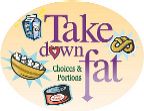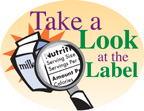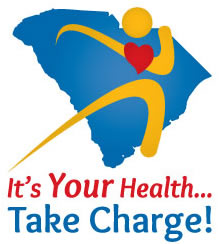Good nutrition is essential for proper growth and development, overall good health, and physical and mental wellness. The consumption of too much fat and too few vegetables, fruits, and whole grain products have been found to increase the risk of developing coronary heart disease, some types of cancer, stroke, and Type 2 diabetes. To reduce the risk of early death due to diseases caused by poor diet, a daily intake of five to nine servings of vegetables is recommended. In 2000, about 75% of South Carolinians were not eating enough fruits and vegetables. In addition, about 28% had high blood pressure and over 59% were overweight or obese.
Do You Know?
The serving sizes for:
-
meat, poultry and seafood are 3 ounces. This is about the size of a deck of cards.




- pasta is 1/2 cup, or about the size of 1/2 a baseball.
- cheese is 1 1/2 ounce or the size of four dice.
How to take away 100 calories?
- Eat smaller portions.
- Leave a few bites on your plate.
- Choose water instead of a high calorie drink.
- Choose the regular size instead of the super size.
Take a Look at the Label Smart Shopping Tips
- Make a shopping list and stick to it. Planning ahead can help you to avoid buying foods on impulse, and keep to a budget.
- Start shopping at the outside aisles. Choose fresh fruits and vegetables, low fat milk products, lean meats, poultry, fish and whole grain breads before shopping for convenience food items and snacks.
- Increase your fiber intake by purchasing foods with 5 grams or more of fiber per serving.
- Make every calorie count. A donut and a slice of whole grain wheat bread may have the same calories, but there are more vitamins in whole grain wheat bread.
It All Adds Up—Read the Label
- The label information is based on a serving size of the food. This may be more or less than what you actually eat.
- Try not to eat foods with saturated fats, trans fats and partially hydrogenated oils, or foods that are high in cholesterol and sodium like fast foods, chips and other snack foods.
- Get LESS—If fat, sodium or cholesterol is less than 5% it is low, greater than 20% is too much.
- Get ENOUGH—If fiber, vitamins and minerals are less than 5% it is low, greater than 20% is high.
For more information, call toll-free:
1-866-369-9333

Printable Information ( pdf )
- Kids Taking Charge in the Kitchen
- Teens Taking Charge in the Kitchen
- Taking Charge in the Meadowland
- Take Charge Of Your Plate! Placemat
- Activity Book - Activities & Tip for Healthy Eating
- Healthy Heart & Soul Recipe Book
- Take A Look At The Label - Sheet 1
- Take A Look At The Label - Sheet 2
- Take Action: How Long Does It Take To Burn 100 Calories?
- Take Action: Get Up And Get Going!
- Take in More Fruits And Veggies: For About 100 Calories, You Can Have...
- Take Down Fat: Tips For Dining Out
- Take Down Fat: Cooking And Eating At Home
- Make Half Your Grains Whole
- Make Half Your Grains Whole: Ways to Get More Grains
- Take In More Fruits and Veggies: Easy Ways to Take More
Videos
In accordance with Federal law and U.S. Department of Agriculture policy, this institution is prohibited from discriminating on the basis of race, color, national origin, sex, age, religion, political beliefs, or disability.
To file a complaint of discrimination, write USDA, Director, Office of Civil Rights, 1400 Independence Avenue, S.W., Washington, D.C. 20250-9410 or call (800) 795-3272 (voice) or (202) 720-6382 (TTY). USDA is an equal opportunity provider and employer.



